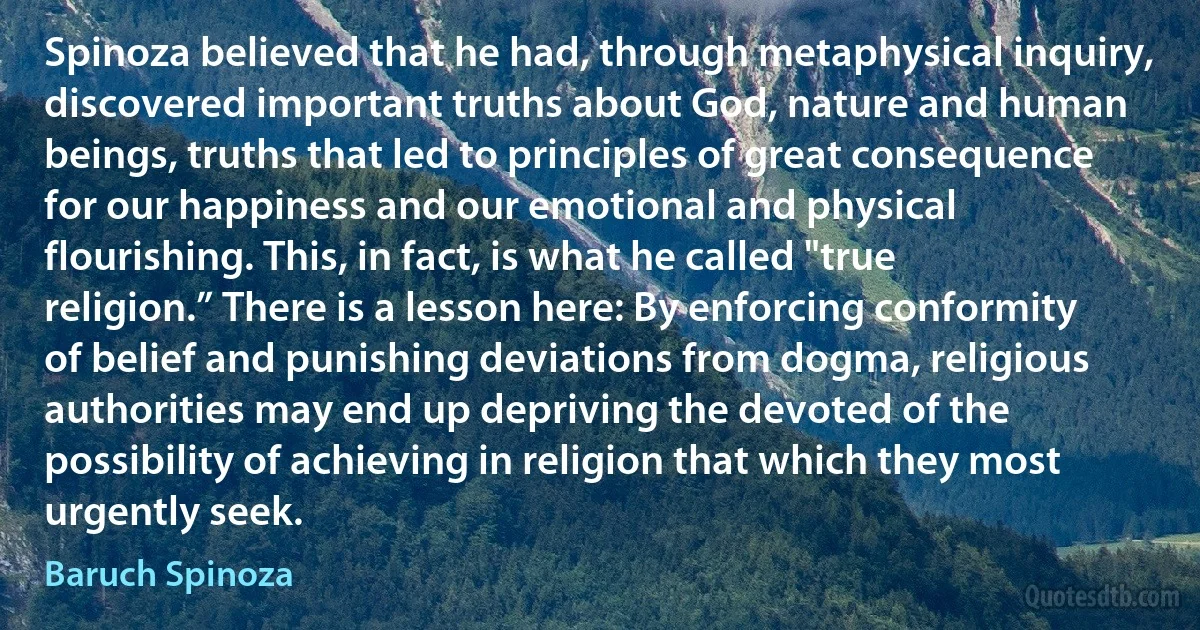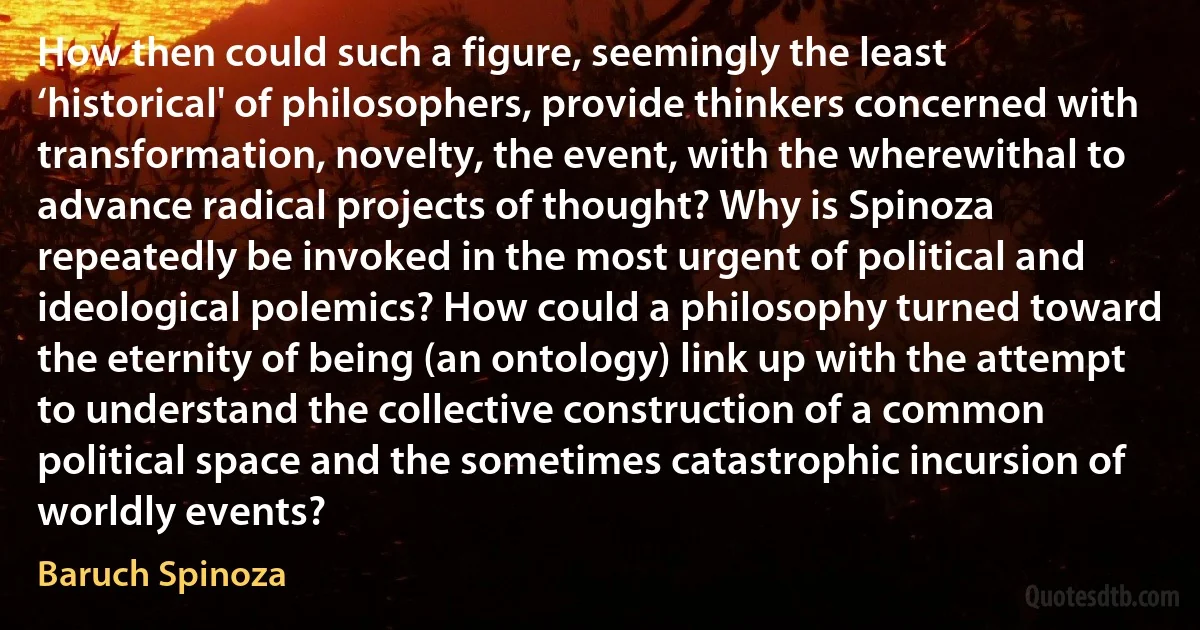Baruch Spinoza quotes - page 13
...For millennia, wrongdoers overtaken by punishment have felt no different than Spinoza with regard to their 'offence': 'something has gone unexpectedly wrong here', not 'I ought not to have done that'–, they submitted to punishment as you submit to illness or misfortune or death, with that brave, unrebellious fatalism that still gives the Russians...

Baruch Spinoza
That our modern natural sciences have become so thoroughly entangled in this Spinozistic dogma (most recently and worst of all, Darwinism with its incomprehensibly onesided doctrine of the "struggle for existence”) is probably due to the origins of most natural scientists: In this respect they belong to the "common people”; their ancestors were poor and undistinguished people who knew the difficulties of survival only too well at firsthand.

Baruch Spinoza
There is no place in Spinoza's system for a sense of mystery in the face of nature. Such an attitude is to be dispelled by the intelligibility of things. Religious wonder is bred by ignorance, he believes. Spinoza contrasts the person who "is eager, like an educated man, to understand natural things" with the person who "wonders at them, like a fool". For Spinoza, anyone who would approach nature with the kind of worshipful awe usually demanded by the religious attitude represents the latter. By definition, and in substance, pantheism is not atheism. And Spinoza is an atheist.

Baruch Spinoza
I am utterly amazed, utterly enchanted! I have a precursor, and what a precursor! I hardly knew Spinoza: that I should have turned to him just now, was inspired by "instinct". Not only is his overtendency like mine - namely, to make all knowledge the most powerful affect - but in five main points of his doctrine I recognize myself; this most unusual and loneliest thinker is closest to me precisely in these matters: he denies the freedom of the will, teleology, the moral world-order, the unegoistic, and evil. Even though the divergencies are admittedly tremendous, they are due more to the difference in time, culture, and science. In summa: my lonesomeness, which, as on very high mountains, often made it hard for me to breathe and make my blood rush out, is now at least a twosomeness. Strange!

Baruch Spinoza
Of all the great modern philosophers, Spinoza is probably the most interesting in relation to human life, and is certainly the most lovable and high-minded. Unfortunately, the difficulty and crabbedness of his writing make it very hard for people who are not serious students of philosophy to understand even what is not inherently difficult in his doctrines. He therefore requires commentaries to translate him into easier language, if his main ideas are to be appreciated as widely as possible. [...] Spinoza's philosophy, however, whether we agree with it or not, remains one of the noblest monuments of human genius, and whoever makes it more widely accessible is doing a useful work. To readers unacquainted with philosophy, Mr. Picton's book may therefore be confidently recommended.

Baruch Spinoza
Spinoza's ethical views are inextricably intertwined with his metaphysics, and it may be doubted whether his metaphysics is as good as is supposed by followers of Hegel. But the general attitude towards life and the world which he inculcates does not depend for its validity upon a system of metaphysics. He believes that all human ills are to be cured by knowledge and understanding; that only ignorance of what is best makes men think their interests conflicting, since the highest good is knowledge, which can be shared by all. But knowledge, as he conceives it, is not mere knowledge as it comes to most people; it is "intellectual love,” something coloured by emotion through and through. This conception is the key to all his valuations.

Baruch Spinoza
The philosopher John Toland, in the early 18th century, insisted that the terms 'Spinozism' and 'pantheism' are synonymous. Toland says that "Moses was, to be sure, a Pantheist, or, if you please, in more current terms, a Spinosist", while Spinoza's pantheism was taken for granted by Moses Mendelssohn, Gotthold Lessing and Friedrich Jacobi, in their famous Pantheismusstreit of 1785. More recently, this interpretation also appears in both the scholarly literature and popular representations of Spinoza's thought. In the recently published Cambridge Dictionary of Philosophy we read that "Spinoza is the most distinguished pantheist in Western philosophy". But the problem with calling Spinoza a 'pantheist' is that pantheism is still a kind of theism.

Baruch Spinoza
...To the extent that we are committed to the ideal of a secular society free of ecclesiastic influence and governed by toleration, liberty, and a conception of civic virtue; and insofar as we think of true religious piety as consisting in treating other human beings with dignity and respect, and regard the Bible simply as a profound work of human literature with a universal moral message, we are the heirs of Spinoza's scandalous treatise [Tractatus Theologico-Politicus].

Baruch Spinoza
Spinoza's views on God, religion and society have lost none of their relevance. At a time when Americans seem willing to bargain away their freedoms for security, when politicians talk of banning people of a certain faith from our shores, and when religious zealotry exercises greater influence on matters of law and public policy, Spinoza's philosophy – especially his defence of democracy, liberty, secularity and toleration – has never been more timely. In his distress over the deteriorating political situation in the Dutch Republic, and despite the personal danger he faced, Spinoza did not hesitate to boldly defend the radical Enlightenment values that he, along with many of his compatriots, held dear. In Spinoza we can find inspiration for resistance to oppressive authority and a role model for intellectual opposition to those who, through the encouragement of irrational beliefs and the maintenance of ignorance, try to get citizens to act contrary to their own best interests.

Baruch Spinoza
The political ideal that Spinoza promotes in the Theological-Political Treatise is a secular, democratic commonwealth, one that is free from meddling by ecclesiastics. Spinoza is one of history's most eloquent advocates for freedom and toleration. The ultimate goal of the Treatise is enshrined in both the book's subtitle and in the argument of its final chapter: to show that ‘freedom to philosophise may not only be allowed without danger to piety and the stability of the republic, but that it cannot be refused without destroying the peace of the republic and piety itself'.

Baruch Spinoza
It seems to me that Spinoza shares the fate of good old Saturn in the fable. The new gods pulled down the sublime one from the lofty throne of knowledge. He faded back into the solemn obscurity of the imagination; there he lives and now dwells with the other Titans in dignified exile. [Original in German: Spinosa, scheint mirs, hat ein gleiches Schicksal, wie der gute alte Saturn der Fabel. Die neuen Götter haben den Herrlichen vom hohen Thron der Wissenschaft herabgestürzt. In das heilige Dunkel der Fantasie ist er zurückgewichen, da lebt und haust er nun mit den andern Titanen in ehrwürdiger Verbannung.].

Baruch Spinoza
Many I believe will wonder at this juxtaposition, not seeing that he is like Spinoza, or that he holds the same conspicuous position in art as Spinoza in science. Without destroying the balance of the Speech, I could only suggest my reason. There is now another reason why I should say no more. During these fifteen years the attention to Spinoza, awakened by Jacobi's writings and continued by many later influences, which was then somewhat marked, has relaxed. Novalis also has again become unknown to many. At that time, however, these examples seemed significant and important. Many coquetted in insipid poetry with religion, believing they were akin to the profound Novalis, just as there were advocates enough of the All in the One taken for followers of Spinoza who were equally distant from their original.

Baruch Spinoza
[When Leibniz and Spinoza met in The Hague in 1676] The encounter between the two greatest philosophers of the seventeenth century in fact extended over several days. From a letter Leibniz posted to the Duke of Hanover's secretary from Holland, it is possible to infer that the courtier arrived in The Hague on or before November 18 and remained for at least three days and possibly as much as one week. Leibniz later told his Parisian friend Gallois that he had conversed with Spinoza "many times and at great length".

Baruch Spinoza
According to the seventeenth-century way of thinking, an atheist was by definition a decadent. If there was no God (or, at least, no providential, rewarding-and-punishing God of the sort worshipped in all the traditional religions), the reasoning went, then everything is permitted. So a non-beliver would be expected to indulge in all manner of sensual stimulation... to lie, cheat, and steal...
Spinoza, according to all seventeenth-century interpreters, rejected all the traditional ideas about God; he was indesputably a heretic. Yet his manner of living was humble and apparently free of vice. Then, as now, the philosopher seemed a living oxymoron: he was an ascetic sensualist, a spiritual materialist, a sociable hermit, a secular saint. How could his life have been so good, the critics asked, when his philosophy was so bad?

Baruch Spinoza
Neutrality toward Spinoza set in once one was able to admit that the "modern worldview," whose victory was decisively aided by Spinoza's metaphysics, does not, or does not entirely, coincide with this metaphysics. But even at this stage it was still generally maintained, and even emphasized, that among the three great Western philosophers of the seventeenth century - Descartes, Hobbes, and Spinoza - Spinoza was the most important one because, he was the most progressive one. He alone had drawn certain consequences from the foundations of modern philosophy, which became fully clarified only in the nineteenth century and which henceforth determined the general consciousness.

Baruch Spinoza
...Similarly, he [Hermann Cohen] states that Spinoza opposed rabbinical Judaism, especially its great concern with the ceremonial law, and that his sharp opposition had a certain salutary effect on the liberation of opinion; he notes without any disapproval that "modern Judaism” has freed itself from part of the ceremonial law; he fails to admit that modern Judaism is a synthesis between rabbinical Judaism and Spinoza.

Baruch Spinoza
Certain critics from the democratic camp, inclined to operate with the help of indirect evidence, have looked upon the "ironic” attitude of the author to the compromise leaders as the expression of an undue subjectivism vitiating the scientific character of his exposition. We venture to regard this criterion as unconvincing. Spinoza's principle, "not to weep or laugh, but to understand” gives warning against inappropriate laughter and untimely tears. It does not deprive a man, even though he be a historian, of the right to his share of tears and laughter when justified by a correct understanding of the material itself.

Baruch Spinoza
![...They [the Jews] have had the most painful history of all peoples, not without the fault of all of us, and when one owes to them the noblest man (Christ), the purest sage (Spinoza), the most powerful book, and the most effective moral law in the world. [Original in German: Trotzdem möchte ich wissen, wie viel man bei einer Gesamtabrechnung einem Volke nachsehen muß, welches, nicht ohne unser aller Schuld, die leidvollste Geschichte unter allen Völkern gehabt hat, und dem man den edelsten Menschen (Christus), den reinsten Weisen (Spinoza), das mächtigste Buch und das wirkungsvollste Sittengesetz der Welt verdankt.]. (Baruch Spinoza)](https://cdn.quotesdtb.com/img/quotes_images_webp/24/baruch-spinoza-book-christ-1015224.webp)


